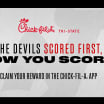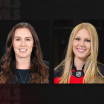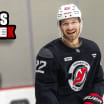BUFFALO, N.Y. -- When a prospect enters the New Jersey Devils' suite at KeyBank Center during the NHL Scouting Combine, he is introduced to Dr. Aimee Kimball, director of team and player development.
Kimball poses most of the questions during each 20-minute interview. As a sports psychologist, she asks specific questions that have no right or wrong answers, but will give her more insight into what motivates players. It's all part of the Devils' effort to learn more about each prospect and whether he could add to the culture of winning that general manager Ray Shero and coach John Hynes are developing in New Jersey.
Get to Know Dr. Aimee Kimball
Dr. Aimee Kimball is making a huge impact behind-the-scenes at the NHL Scouting Combine
By
Julie Robenhymer @JulieRobenhymer / newjerseydevils.com
Kimball, who has degrees in sports psychology from Penn State, Miami and Tennessee, started working with professional hockey players by chance.
"I worked with a sports medical center in Pittsburgh and they were the medical provider for the Pittsburgh Penguins, and I was asked to come into a development camp to give a mental training talk," she said. "At the time, Todd Richards, who is now an assistant coach with Tampa Bay, was the head coach of the Penguins' minor league team in Wilkes-Barre and he asked if I'd come to Wilkes-Barre and work with his players. The next year, I started working with their NHL players as well."
She was with the Penguins for 10 years and was an integral part of two Stanley Cup seasons before joining the Devils last August.
"She was with me in Pittsburgh," Shero said. "I hired her there my first year and she's done a lot with mental skills training not only at the NHL level, but it was really beneficial having her work with our AHL players in terms of developing a culture of success. It's been really great seeing the players she's worked with graduate over the years to the NHL level and be successful and win the Stanley Cup last year and be back in the Final again this year.
"For us here [at the Combine], what I've found with her work is that it's different from the questions we'd ask. Finding out everything you can about a person in 20 minutes is not our area of expertise, but it is for her. … She asks some tough questions."
While she asks simple things like, "What do you do in your spare time?" or "Why should we pick you?" she also asks more difficult questions like, "Would you rather be an NHL player for 10 years and never win a championship or only play one year but win the Stanley Cup?"
Some players had trouble with that last one, asking if there was an option to do both or to win the Cup every year for 10 years, while others were a little more certain. One replied almost immediately, "I'd play one year, win the Cup and go play in Europe. I'd be fine with that as long as I get to win it once."
Each prospect was also given a short this-or-that type quiz Kimball developed, which included questions like, "Would you rather be a good player or a good person?" and "Would you rather be good in practice or good in games?" All the information gathered will be added to each player's prospect profile right along with how well they skate and perform on the power play, and it's all part of the process to pick the right players - and right people - to rebuild the franchise into a consistent winner.
"What I do isn't just about sports psychology and doing mental training," Kimball said. "It's more about looking at the players and the team and figuring out how to develop them in terms of the culture of the team. Getting players to realize what it really takes to be winners - to win the Stanley Cup. They're all competitive and, as professional hockey players, nobody likes to lose, but yet it's still happening. So getting them to have confidence in each other and confidence in the system and understanding that just showing up isn't enough and getting them to look at their own games and assess ways they can be better on or off the ice is what I try to do.
"It's all about helping them understand that if they want to be successful, and this mental part of their game is an area they can improve on, then this is something they really need to take the time to work on. It's also about helping them to understand what their role is, especially for the younger players. They were probably stars on their junior teams or in college and they were making a difference every night, and then when they come here their role might be different. So it's a matter of helping them to accept that role, while also striving for more."
Kimball also admits that one of her challenges is overcoming the stigma surrounding mental health.
"A big part this is getting over the thought that there's something wrong or that they're crazy," she said. "I try to help them see that it's just another part of training. They're used to physical training and skills training, and this is mental training. If it's not a part of their game that they're working on, they should be, because at some point they will struggle. They might not score or maybe the team loses a few games in a row, and just having them realize the more consistent they are mentally, the more consistent they will be physically."
She's also a neutral party. While she spends time with the team in person at least once a month, she's also available to every player in the organization at both the NHL and AHL level whenever they might need it.
"They know that I'm here to help them and provide guidance, especially to the younger players who are adjusting to being a professional athlete," she said. "But I don't dictate ice time and I don't share the information with coaches or management. I'm trusted to take the information the players share with me and help them take on the challenge and become better."
As a former athlete herself, Kimball understands the competitive nature of sports and the desire to be challenged. In fact, that's a big reason why she chose to join the Devils when Shero approached her about it last summer.
"For 10 years, I worked with a culture that had seen success and had arguably some of the best players in the world. It was so much fun to be part of that and see it firsthand and help the younger players acclimate to that kind of culture and that kind of system," she said. "So being able to take a team that hasn't seen a lot of winning in recent years and get them back to that level of success and help them understand that it is a culture shift -- a mindset shift -- and get them to accept that and hold each other accountable … that was a challenge and a new experience that I wanted to be part of.
"I just really liked the idea of building something and being part of that process, and I have complete confidence in Ray and how he sees things and his vision for the future and the people he's bringing on board to help make it possible."


















